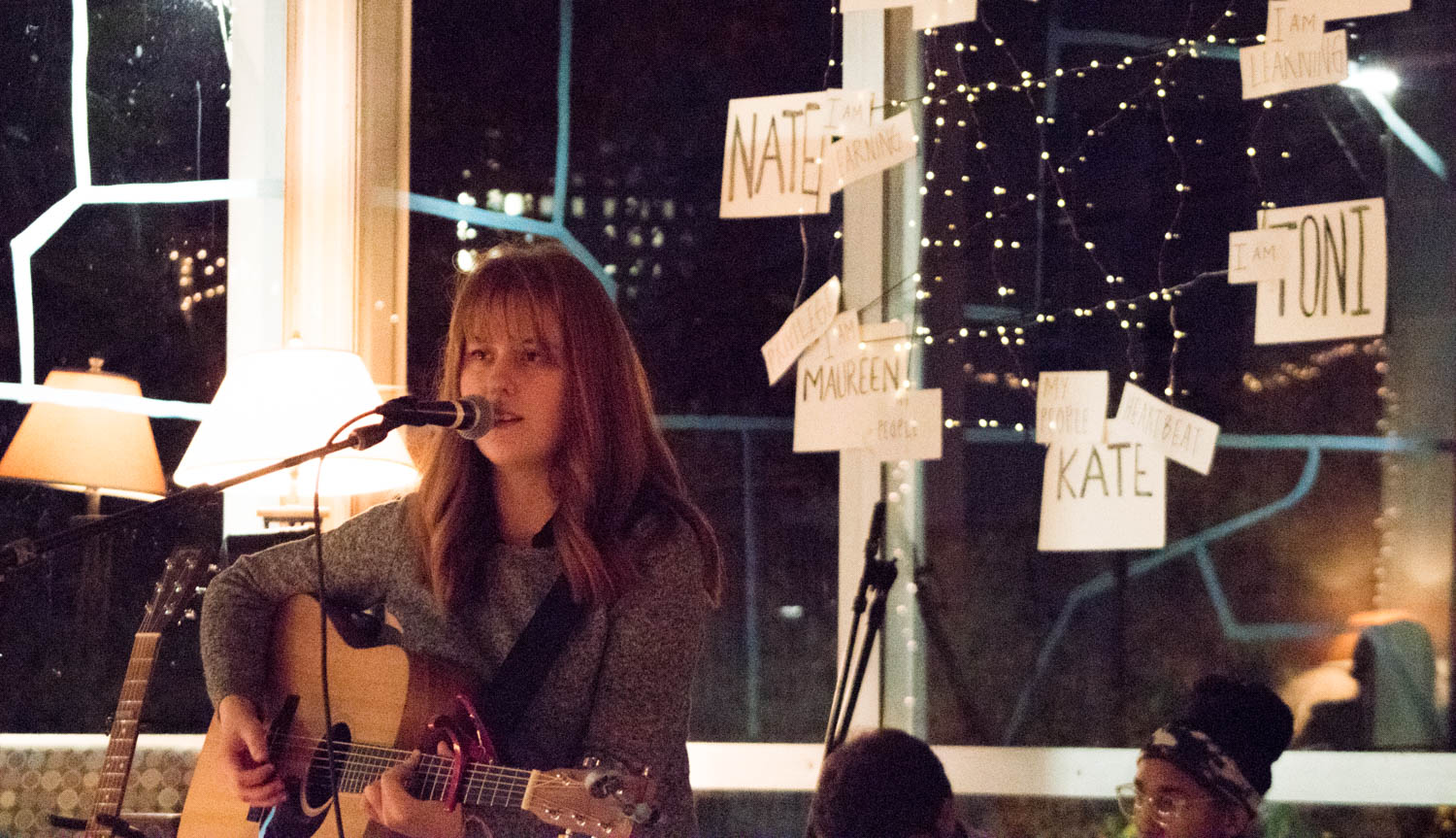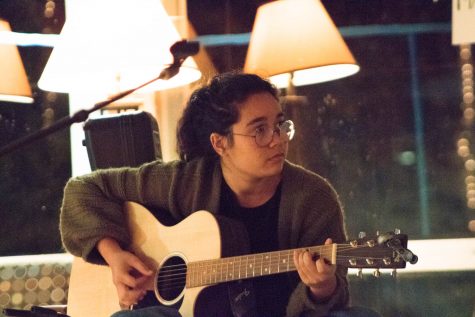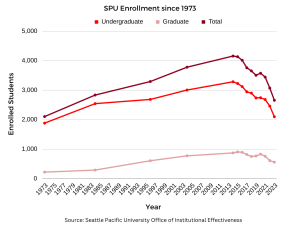Relationship in opposition
Roommates with ideological differences embrace discourse
November 7, 2019

Kate Bischoff singing an original song during Listen at Hill Hall.
One person majoring in social justice and the other majoring in social injustice.
This is the joke between roommates Kate Bischoff, a sophomore secondary education major, and Laur Lugos, a sophomore double majoring in music composition and social justice.
This duo has seemingly diametrically-opposed ideological differences on topics such as abortion and immigration issues that, in a divided nation, seem hard to overcome.
Through a mutual respect for each other, the two have formed an open dialogue that has allowed them to talk openly about modern issues.
“When you are having a political argument with someone you disagree with, there is a lot of pressure to have all the answers, but with Laur I never really feel that pressure. I know she will forgive me for not knowing everything because we are both human,” Bischoff said.
This foundation of understanding is what allows them to remain close despite their differences in political beliefs.
However this truth does not get rid of the fact that both value very different causes based on their own personal experiences and identities.
Lugos was first introduced to the importance of advocating for social justice through a class she took at her high school, which was primarily composed of students of color.
“That [class] was a big light-switch-moment for me where I was able to see that the world is bigger than the world I can see and that there are systems at play that make it so that the injustices that I see on the news happen,” Lugos stated.
Expanding her worldview to more closely examine the injustices occurring, she found that even in her own life and family there were problems stemming from racial issues.
Lugos is of mixed race, which, after noticing injustices in her own community, has turned her towards fighting for racial justice.

Laur Lugos playing guitar during the Listen event in Hill Hall on Friday Nov. 1st
“I am mixed race and I have a white mom and a brown dad. I’ve grown up seeing the ways that people of different races treat each other and I don’t like it,” Lugos said.
After noticing this injustice in her own community, Lugos has turned towards fighting for racial justice. An example of this is her role as Hill Hall’s Social Justice Director and Intercultural Coordinator.
This may seem to be in stark contrast to Bischoff who advocates against abortion due to her experiences and own identity.
“I’ve always held the belief that the unborn deserve rights and the unborn are human, but it was really after going to this conference in high school, this leadership conference in Colorado where they talked a lot about that (abortion) and the apologetics of the pro-life movement,” Bischoff said.
This belief and her experience at the conference has led her to the position as the vice president of the Students for Life of America club on campus to continue advocating against abortion and for alternative solutions to abortion.
Her position on abortion was also influenced by her experience being diagnosed as autistic and how abortion can have serious consequences for infants who may be perceived as having less value than others.
“In short, being a part of this community, everyone who has a disability I kind of see as my people now, and when you predicate human worth on someone’s abilities then that maybe inadvertently attacks the special needs community,” Bischoff said.
“It says you are valuable not for who you are but what you can do.”
These issues may seem like indications of two very different mindsets. It is clear, though, that both Lugos and Bischoff are fighting a similar battle, just with different methods.
“Since I am a little bit more conservative people see social justice as a more liberally charged term and so its like, ‘well then what am I a social injustice major?’ It’s unfair to make that distinction because we both really want what is best for society and humanity. We just see a different way of going about it,” Bischoff said.
No matter their differences, there lies the underlying truth that both want to better the world they live in — even if they have different ways of going about it.
To try to open up a dialogue on political issues, the roommates used their shared interest in music.
“I think that art is the foundation of social change. I know that with whatever I am doing, and I do anticipate that it will be with music at this point in my life, I know that I will be shifting atmospheres and social spaces wherever I am and I think that will influence politics and greater social change,” Lugos said.
An example of Lugos’ belief in the power of arts to create social change is Bischoff’s own music, such as her piece “Little Miracle,” which discusses abortion.
Music has also been that Lugos and Bischoff have expressed their thoughts to each other.
Lugos expressed how over the summer she was really hurt over the ICE raids that were happening in her hometown of San Jose, and how her friends were endangered by those raids.
In response, rather than get into a political argument, Bischoff expressed herself through music.
“She took a second and was trying to think of what to think and ended up writing a song called ‘Felix Culpa,’ which means fortunate fall,” Lugos said.
“She was trying to relate what was happening to biblical context and she ended up coming to a conclusion in one of her verses that perhaps there were systems of power at play similar to Pharaoh.”
By using their love for music as a vessel for discussion, rather than being afraid of discussing hard issues, both have created an environment for meaningful discussion and hope others can create similar environments within their own groups.
“I want everyone in the same room. What I mean by that is that I want people to start considering that the world is bigger than they are,” Lugos said.
“I think when you realize how interconnected we are then you can’t help but acknowledge that your actions affect other people and that your vote matters.”

























































































